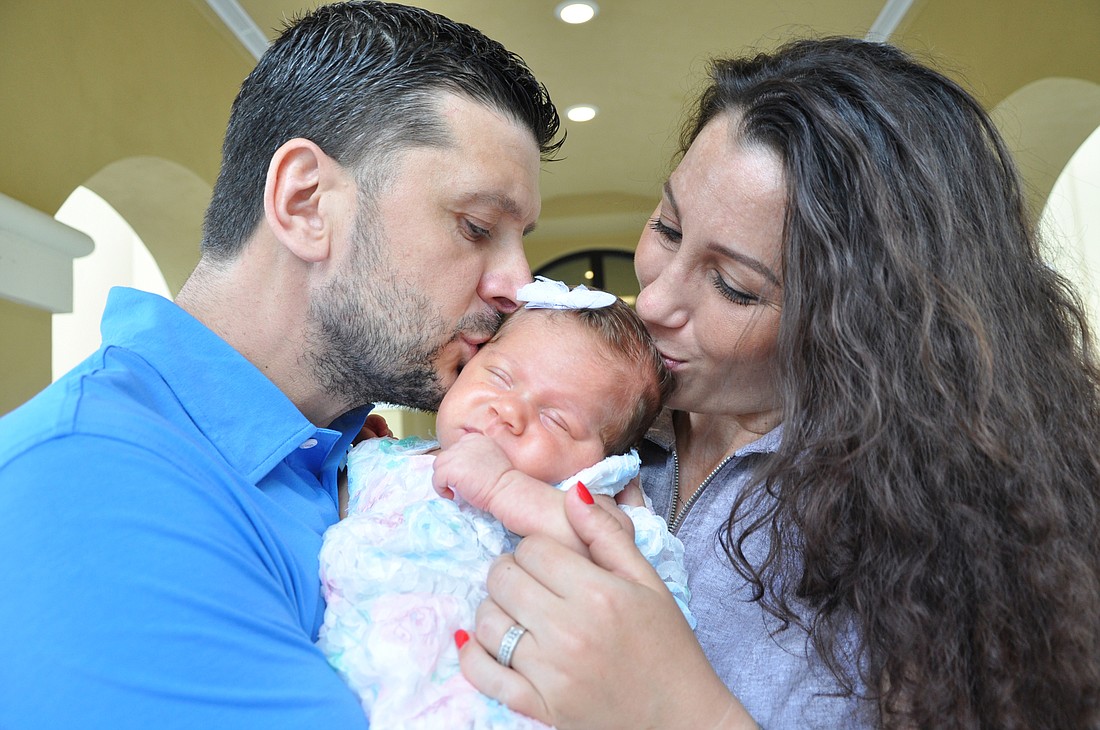- April 25, 2024
-
-
Loading

Loading

It’s difficult for Ramona Anghel to describe how special this Mother’s Day is going to be. After all, it’s her first one as a mom.
After years of trying to have a child and multiple tragic disappointments, west Orlando couple Anghel and Ciprian Neagu welcomed their daughter, Eliana Andreea Anghel, into the world six weeks ago with the help of treatment and guidance from the Center for Reproductive Medicine in Winter Park.
It marks a joyous conclusion of a period during which the couple struggled to achieve their ultimate goal: having a child of their own.
That difficult journey began with an ectopic pregnancy in 2013.
“After trying for so many years, it was a surprise and a disappointment at the same time when it was ectopic,” Anghel said.
The couple made the decision to seek some help in 2016, meeting with Dr. Sejal Dharia Patel — a doctor of reproductive endocrinology and infertility at the Center for Reproductive Medicine.
After a series of tests, the couple were put on the path of in vitro fertilization — where an egg and sperm are combined outside of the body in the lab and an embryo is placed back inside the woman’s uterus.
To make the in vitro process a success, Anghel underwent a six-week process of medications and injections to create the embryos. She then underwent a six-week process to prepare the lining of the uterus to receive the embryo, taking both injections and pills of estrogen, followed by progesterone.
It’s wasn’t always easy, Anghel said, because the couple’s lives seemed to always revolve around the next shot.
“We would go have dinner, and when it was time for the progesterone, we would go in the bathroom, and he would give me the shot,” Anghel said. “There was some medications that you had to inject early in the morning and some at night, so everything revolved around that.”
“The dedication of patients with infertility and their drive to want to become parents is so inspiring,” Patel said. “I think that’s what makes us want to do what we do every day.”
Anghel’s first pregnancy through the in vitro process was unfortunately unsuccessful. The baby stopped growing at seven weeks in June 2017.
Patel said Anghel had a genetic mutation that made her more susceptible to blood clots, which can block blood flow and potentially prevent a baby from growing.
This required Anghel to see a hematologist for yet more treatment to address the blood clot issue.
A couple of months after the first transfer pregnancy, the couple tried again, and Anghel got pregnant a second time. The pregnancy was revealed to be life-threatening Dec. 26, 2017, while she was in Romania — she had yet another ectopic pregnancy and had left for Europe just before her next appointment with Patel.
“I ended up in the emergency room with internal bleeding — it was another ectopic,” Anghel said. “I didn’t know it was going on, so it was too late, and it ruptured. They had to do a surgery, and we lost the baby.”
For Anghel and Neagu, the third time was the charm. After a successful embryo transfer Aug. 1, 2018, the pregnancy was a happy, healthy one.
Little Eliana was born March 29, 2019. She was named after Anghel’s father, Ilie, who died from cancer last September.
“She’s the missing piece from our lives,” Anghel said.
“It’s something I can’t explain,” Neagu said. “I can’t believe it.”
“Two years into this, you can imagine what they went through and how costly it was,” Patel said. “Every time something happens, we go back to the drawing board, and we do 70 different tests to try and find a blood-clotting disorder. When you think of how this journey is, this has to be one of the toughest journeys. … This outcome is so priceless.”
Anghel said she knows it was difficult — how mentally, physically, emotionally and financially taxing it all was. But as she looks at her 6-week-old daughter, she also knows this: It was worth it.
“I would do it all over again,” Anghel said.